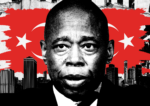Even before Mayor Eric Adams was indicted, several progressives had lined up to replace him.
Now, the specter of the mayor stepping down, being removed, or waging a weak re-election campaign has brought a new sense of urgency to the race.
Real estate professionals in the city, who tend to favor moderate politicians, had found an ally in Adams. But so far, those who have announced they are running or seriously considering it are politically to the left of Adams, some dramatically so.
Here is a look at the contenders’ real estate records and what they have said they would prioritize as mayor.
Public Advocate Jumaane Williams
If Adams steps down or is removed by the governor, Williams will temporarily take over. As interim mayor, Williams would not be able to appoint or remove agency heads, and for nine days would be barred from signing or vetoing laws. He would, however, have authority over the budget and be able to negotiate with the City Council. It is expected that he would then run for a full term.
Williams publishes the annual “Worst Landlords” list, as previous public advocates did. Last year the City Council passed his Worst Landlord Law, which increased financial penalties for various housing violations and created a watchlist for properties whose landlords self-certify that hazardous violations have been resolved.
In past bids for higher office, Williams has supported measures that put him at odds with much of the real estate industry. In his failed campaign against Gov. Kathy Hochul in the 2022 Democratic primary, he pitched overhauling Empire State Development to ensure that it partnered with nonprofits to build permanently affordable housing on state-owned land. The state legislature has picked up on a similar thread, pushing to create a social housing authority to build housing on state-controlled properties.
Williams also supported Sen. Jessica Ramos’ proposed tax on New York’s billionaires. When he ran for lieutenant governor in 2018, Williams backed the idea of universal rent control.
As a Council member, he championed a measure that required construction workers to complete 40 hours of training. The Real Estate Board of New York opposed the bill. At the time, Williams criticized the group for not being a better partner in the lead-up to the measure’s passage.
Sen. Jessica Ramos
Ramos, who became chair of the Senate’s Labor Committee in 2019, may be able to count some of the city’s most influential unions among her supporters.
She has aligned herself with the city’s construction unions on key issues. Ramos was among a group of lawmakers who called on the governor, in replacing the expired property tax break 421a, to include prevailing wage requirements for projects with more than 100 apartments. Ramos referred to the expired tax break program as a “boondoggle.”
She also sponsored a bill that passed in 2021 that forced construction managers to assume responsibility for unpaid wages, benefits and attorney fees on their projects.
Ramos, however, has refused to introduce legislation that Mets owner Steven Cohen needs to build a casino, open space and other attractions next to Citi Field, in her district. In February, a group of unions sent Ramos a letter urging her to “do everything in your power to make Metropolitan Park a reality,” according to Politico New York.
The Queens senator has supported pro-tenant legislation, including good cause eviction. In a post Tuesday on the social media platform X, Ramos lamented that in her 13 years as a rent-stabilized tenant, her rent has gone up the most during the Adams administration.
“While he’s prepping for trial, we’ve lacked leadership that knows the rent is too damn high,” she wrote, quoting a phrase the mayor has used himself.
In June, the city’s Rent Guidelines Board, whose members are selected by the mayor, approved a 2.75 percent increase on one-year leases, which went into effect for renewals starting Oct. 1. The maximum annual rent hike under Adams was 3.25 percent.
Rent-stabilized landlords argued that the increases will not keep up with rising costs and don’t address the distress plaguing their buildings.
Comptroller Brad Lander
While in the City Council, Lander pushed legislation that would have banned for-profit developers from acquiring city-owned land slated for affordable housing. He scored points with the industry, however, when he pushed to rezone more than 80 blocks in Gowanus. The measure passed in 2021 and was projected to spur the construction of 8,500 new homes by 2035.
Lander was critical of the multifamily development tax break 421a, although its expiration and 2026 construction deadline imperiled many Gowanus projects. But this year the state extended the construction deadline to 2031 and introduced a new tax break for future projects.
He calls the Gowanus rezoning a model for other neighborhoods. Lander supports the Adams administration’s City of Yes for Housing Opportunity, which requires Council approval, but said he would take less of a top-down approach.
“I don’t think the best answer is a kind of ‘take your medicine’ approach,” Lander said in an interview. “I think what will work in the long term is, how do we help people believe genuinely that growth will include them?”
Sen. Zellnor Myrie
Over the past few years, the Brooklyn senator has supported several measures feared by the real estate industry.
In 2019, Myrie was one of the most vocal proponents of the Housing Stability and Tenant Protection Act, which property owners have blamed for plunging rent-stabilized apartment buildings into distress.
In 2021, Myrie pitched the Tenant Opportunity to Purchase Act, which would give tenants dibs on buying their building if the owner decides to sell. He was also among the lawmakers, including Ramos, who threatened to reject any housing deal in the state budget this year that did not include good cause eviction. A watered-down version of good cause passed, but TOPA has not.
On the plus side for real estate, Myrie has emphasized the need to build more homes to address the city’s housing crisis.
In an Op-Ed, Myrie called Gov. Kathy Hochul’s Housing Compact — which set housing growth targets across the state — imperfect, but expressed disappointment that it did not pass. He also backed a proposal to rezone a site in Brooklyn to allow for a 244-unit residential building, which has faced some opposition from neighbors and the local Assembly member.
Scott Stringer
When Stringer unveiled his mayoral campaign in 2020, he was backed by some of the state’s top progressives and took aim at real estate developers.
“No more giving away the store to developers,” the former city comptroller said in September 2020. “No more unaffordable affordable housing.”
At the time, he released a 47-page housing plan that called for “universal affordable housing,” a program that would require projects of 10 or more units to make at least 25 percent of the apartments affordable. Developers argued that it would prevent many projects from happening.
In an interview Tuesday, Stringer said he was committed to working with the real estate industry to create more housing opportunities. He said his plan from 2021 would serve as a good starting point, but acknowledged the 25 percent set-aside would not be feasible.
Stringer also supports the mayor’s City of Yes for Housing Opportunity, but said the zoning changes do not go far enough in helping the city meet Adams’ goal of building 500,000 housing units in the next decade.
“We have to move bigger and faster to meet our target,” he said. “When I was Manhattan borough president, I worked with community boards and elected officials to involve communities in the planning process. It is hard work, it’s not easy, but I know how to push big projects over the finish line.”
Stringer lost support from the Working Families Party and fellow progressives in April 2021 following allegations of sexual misconduct by a woman who worked for his 2001 race for public advocate. He has denied the allegations and recently received permission from a state appeals court to move forward with a defamation lawsuit against her.
This time, Stringer isn’t positioning himself as the race’s progressive candidate, as at least four others are.
“I’m not running as a progressive, I’m running as a reformer,” he said.
“I do think it’s grown-up time,” he later added. “People are looking for somebody who governs without drama.”
Waiting in the wings
Speaking of drama, former Gov. Andrew Cuomo is reportedly considering running for mayor.
Cuomo, who resigned in 2021 with the state legislature poised to impeach him for numerous alleged incidents of sexual harassment, could be the most moderate Democrat of the bunch, though in his final years as governor he touted himself as a progressive.
Some real estate sources indicated that he would likely be the industry’s pick, given the other options on the table, despite his failure to block the 2019 rent reform — which he signed immediately and with fanfare.
Democratic leaders are also pushing Cuomo’s nemesis, state Attorney General Letitia James, to enter the race, according to the New York Post. James briefly challenged Gov. Kathy Hochul in 2021, but dropped out before the primary. As a candidate, she supported good cause eviction as Hochul remained reticent on the issue.
As attorney general, James has targeted deed theft and cracked down on landlords accused of illegally deregulating stabilized apartments. She also won a $454 million judgment against Donald Trump in a civil case that accused the former president of inflating the value of Trump Organization properties.
Still, she appeared to receive a warm reception from attendees at REBNY’s gala last year. James is seen as more moderate than the declared and potential candidates from the far left.
Among those is Assembly member Zohran Mamdani, a former foreclosure-prevention counselor who belongs to the Democratic Socialists of America, is also pondering a bid, according to City & State.
Republican Council member Joseph Borelli told the Staten Island Advance that he would consider running if a nonpartisan special election is called to replace Adams. Borelli has represented Staten Island on the City Council since 2015, and before that, in the state Assembly.
His name was floated as a potential candidate to lead the supergroup formed from the newly merged Community Housing Improvement Program and the Rent Stabilization Association, but the job went to former Assembly member Kenny Burgos.
Read more



When Borelli ran against Williams for public advocate in 2019, real estate largely ignored the race. At the time, Borelli chalked the lack of interest up to the limited powers of the office. (His candidacy’s lack of viability was likely a greater factor.) Last week, however, he took to social media platform X to post about Williams’ landslide victory.
“Have to ask, [where] were all these people with ‘concerns’ about Jumaane Williams a few years ago?” he wrote alongside a graphic showing that Williams won 78 percent of the vote.
